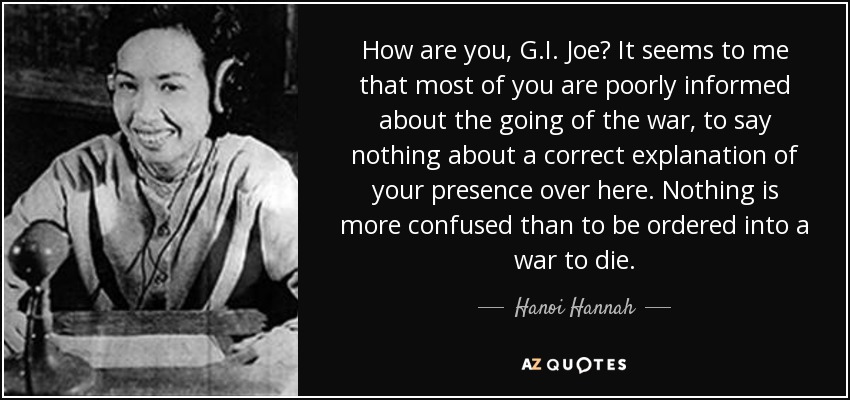Welcome to Teak Publishing's Shortwave Central blog. This blog covers shortwave frequency updates, loggings, free radio, international mediumwave, DX tips, clandestine radio, and late-breaking radio news. Visit my YouTube and Twitter links. Content on Shortwave Central is copyright © 2006-2026 by Teak Publishing, which is solely responsible for the content. All rights reserved. Redistribution of these pages in any format without permission is strictly prohibited.
Monday, October 03, 2016
The legend of Voice of Vietnam's "Hanoi Hannah" passes
Death of “Hanoi Hannah”
Voice of Vietnam , 1 October: Trinh Thi Ngo, a legendary announcer of Radio the Voice of Vietnam (VOV), died in Ho Chi Minh City, at 5.51 am on 30 September at the age of 87. The former announcer of VOV's English service, whose alias was Hanoi Hannah, was awarded emeritus artist title and a medal for her contributions to the development of radio. Her burial service will be held in Long Tri commune, Chau Thanh district, Long An province on 2 October. (VOV World via WRTH Facebook group, via Mike Terry)
(BDXC-Oct)
During the Vietnam War, she became famous among US soldiers for her propaganda broadcasts on Radio Hanoi. (There were actually several "Hanoi Hannahs", but she was the senior and most frequently heard one.) She made three broadcasts a day, reading a list of the newly killed or imprisoned Americans, attempting to persuade US GIs that the US involvement in the Vietnam War was unjust and immoral, and playing popular US anti-war songs in an attempt to incite feelings of nostalgia and homesickness. Though she used the alias Thu Huong, (Vietnamese: "the fragrance of autumn"), the GIs usually called her "Hanoi Hannah" or "the Dragon Lady". Few if any desertions are thought to have happened because of her propaganda work and the soldiers "hooted at her scare tactics", but they were sometimes impressed when she mentioned the correct location of their unit (when they would "give a toast to her and throw our beer cans at the radio") and named US casualties. There were exaggerated legends of her omniscience, with rumors that she would give clues about everything from specific future North Vietnamese attacks to soldiers' girlfriends cheating on them at home. In reality, most of her information came from publications such as the US military newspaper, Stars and Stripes.
Here is an excerpt from one of her broadcasts:
How are you, GI Joe? It seems to me that most of you are poorly informed about the going of the war, to say nothing about a correct explanation of your presence over here. Nothing is more confused than to be ordered into a war to die or to be maimed for life without the faintest idea of what's going on.
A January 1966 Newspaper Enterprise Association article by Tom Tiede described the program:
Hannah's shows are invariably the same. After the news is an editorial denouncing U.S. escalation of the war. Then a recording by an Asian soprano who sounds as if she's having her ears pierced. Then, Mailbag Time ('write us for the truth, friends').
According to war correspondent Don North:
By zapping the truth through an ostrich-like policy censorship, deletions, and exaggerations U.S. Armed Forces Radio lost the trust of many GIs when they were most isolated and vulnerable to enemy propaganda. It wasn't that Hanoi Hannah always told the truth - she didn't. But she was most effective when she did tell the truth and US Armed Forces Radio was fudging it.
After the war, she moved to Saigon with her husband. Ngo was better known in the US than in her own country. She was offered a job on HCMC Television, but she chose to stay at home and take care of her husband, who had suffered a stroke. She remained in Ho Chi Minh City until her death.
